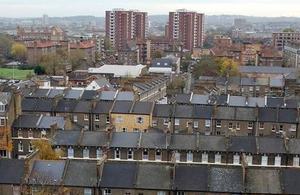Asylum Welcome and of SOAS University of London find an alarming proportion of new refugees experience homelessness
A report published last week by Asylum Welcome and Dr Anna Lindley of SOAS University of London is the latest of numerous reports that highlight problems with the short 28-day 'move-on' period for newly recognised refugees.
 Image credit: UK GovernmentYou can download the 17-page report here.
Image credit: UK GovernmentYou can download the 17-page report here.
As the report explains, people who are successful in obtaining refugee status are given 28 days to move-on from asylum accommodation and support provided by the Home Office. This requires them to open a bank account, find a new place to live, and find a job and/or arrange receipt of mainstream benefits.
The report looks specifically at the challenges of the move-on period for refugees in the Oxford area, and it draws on Asylum Matter's experience of working with newly-recognised refugees.
Oxford is an extremely expensive place to find housing. Problems have worsened for refugees in the area recently due to the Home Office's concentrated effort to clear the asylum backlog in 2023, leading to the highest number of people being granted refugee status since records began in 1984.
The report notes: "The impact of this increase was felt across the country and had a marked effect in the Oxford area. Neither Asylum Welcome nor Oxford City Council have been able to track individuals being granted asylum systematically; the city council has access to a rolling dashboard of decisions, but not cumulative data. It was evident at Asylum Welcome's autumn drop-in advice sessions and from the Homelessness Prevention Applications received by the city council that there was a surge in positive decisions on asylum cases for individuals living in the Oxford contingency accommodation. Soon after, those individuals began to receive Notices to Vacate from the accommodation provider, Clearsprings. Individual refugees, NGOs, and the local authority were poorly prepared for these transitions into the mainstream housing system, highlighting the lack of joined-up working and information sharing between local and national governments, and a failure by the Home Office to recognise and manage the move-on and housing integration challenge."
The need for help with move-on processes among refugees in Oxford has dramatically increased since September 2023, and Dr Anna Lindley and Asylum Welcome found that very few newly-recognised refugees leaving asylum accommodation in Oxford in the past 10 months were able to move directly into private rented housing.
The report states: "An alarming proportion of newly recognised refugees experience homelessness. Oxford City Council records suggest that 12 refugees were homeless, either sleeping rough or staying with friends/acquaintances, at the end of March 2024. In contacting 77 refugees from Oxford contingency accommodation about their housing journeys, we found many more who had experienced some form of homelessness after having been granted refugee status. The solidarity of friends and the wider community helps keep some people off the streets. For instance, one man who was homeless managed to find a bed most nights with different people from his place of worship. Sometimes people have been able to stay for longer periods in informal arrangements with friends and acquaintances. Some people are forced to sleep rough. For example, in March 2024, several people were sleeping in tents near the asylum hotel. People who are rough sleeping often struggle to have their situation verified via the nationwide Street Link system. Another issue reported by homeless charities is that some refugees would disengage due to communication and/or mental health difficulties, not understanding that it was only through sustained contact with homeless charities that they might access shelter placement or specialist support with finding private rented housing."
A series of recommendations are made in the report aimed at improving the support systems for refugees during the critical move-on period. The three key recommendations are as follows:
• Equip newly recognised refugees for moving on better, by providing asylum seekers waiting a decision on their claim with right to work, more English language provision, and community-based accommodation for a reduced period of asylum processing.
• Increase the move-on period from 28 to at least 56 days, to give newly recognised refugees a better chance of completing the tasks required to avoid homelessness and destitution, thereby reducing subsequent costs to the state.
• Improve collaboration within and between organisations involved in the local move-on process, including the local authority, the Home Office, the asylum accommodation provider, housing associations, landlords, and third-sector organisations, to facilitate refugees' access to housing.
Dr Anna Lindley said: "The period after getting refugee status should be one where people start a new phase of life in the UK in a positive way. Instead, it is too often a period of precarity, homelessness and enormous stress. This is entirely counter-productive and undermines longer-term integration."
Meanwhile, the newly appointed Minister for Border Security and Asylum, Angela Eagle, said in the House of Commons yesterday that the Government was considering extending the move-on period.
The minister was asked by Laura Kyrke-Smith MP whether would she consider extending the move-on period to 56 days, in line with the Homelessness Reduction Act 2017. Angela Eagle responded: "The Government are aware of the need for a smooth transition between asylum accommodation and other accommodation for those asylum seekers who are granted leave to remain. We understand this issue, and we are considering it."